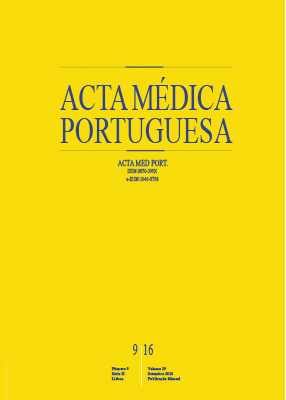Acute Pancreatitis and Posterior Reversible Encephalopathy Syndrome: A Case Report
DOI:
https://doi.org/10.20344/amp.7368Keywords:
Alcoholism/complications, Brain Edema, Pancreatitis, Alcoholic, Posterior Leukoencephalopathy Syndrome.Abstract
The posterior reversible encephalopathy syndrome is a neurological syndrome characterized by headache, confusion, visual disturbances and seizures associated with identifiable areas of cerebral edema on imaging studies. The authors report the case of a man, 33 years-old, leukodermic with a history of chronic alcohol and tobacco consumption, who is admitted to the emergency department for epigastric pain radiating to the back and vomiting with about six hours of evolution and an intense holocranial headache for two hours. His physical examination was remarkable for a blood pressure of 190/100 mmHg and tenderness in epigastrium. His analytical results revealed emphasis on amylase 193 U/L and lipase 934 U/L. During the observation in the emergency department,
he presented a generalized tonic-clonic seizure. Abdominal ultrasonography was performed and suggestive of pancreatitis without
gallstones signals. Head computed tomography showed subarachnoid haemorrhage and a small right frontal cortical haemorrhage. The brain magnetic resonance imaging done one week after admission showed areas of a bilateral and symmetrical T2 / FLAIR hyperintensities in the subcortical white matter of the parietal and superior frontal regions, suggesting a diagnosis of posterior reversible encephalopathy syndrome. Abdominal computed tomography (10 days after admission) demonstrated a thickened pancreas in connection with inflammation and two small hypodense foci in the anterior part of the pancreas body, translating small foci of necrosis. The investigation of a thrombophilic defect revealed a heterozygous G20210A prothrombin gene mutation. The patient was discharged without neurological sequelae and asymptomatic. The follow-up brain magnetic resonance imaging confirmed the reversal of the lesions, confirming the diagnosis.
Downloads
Downloads
Published
How to Cite
Issue
Section
License
All the articles published in the AMP are open access and comply with the requirements of funding agencies or academic institutions. The AMP is governed by the terms of the Creative Commons ‘Attribution – Non-Commercial Use - (CC-BY-NC)’ license, regarding the use by third parties.
It is the author’s responsibility to obtain approval for the reproduction of figures, tables, etc. from other publications.
Upon acceptance of an article for publication, the authors will be asked to complete the ICMJE “Copyright Liability and Copyright Sharing Statement “(http://www.actamedicaportuguesa.com/info/AMP-NormasPublicacao.pdf) and the “Declaration of Potential Conflicts of Interest” (http:// www.icmje.org/conflicts-of-interest). An e-mail will be sent to the corresponding author to acknowledge receipt of the manuscript.
After publication, the authors are authorised to make their articles available in repositories of their institutions of origin, as long as they always mention where they were published and according to the Creative Commons license.









